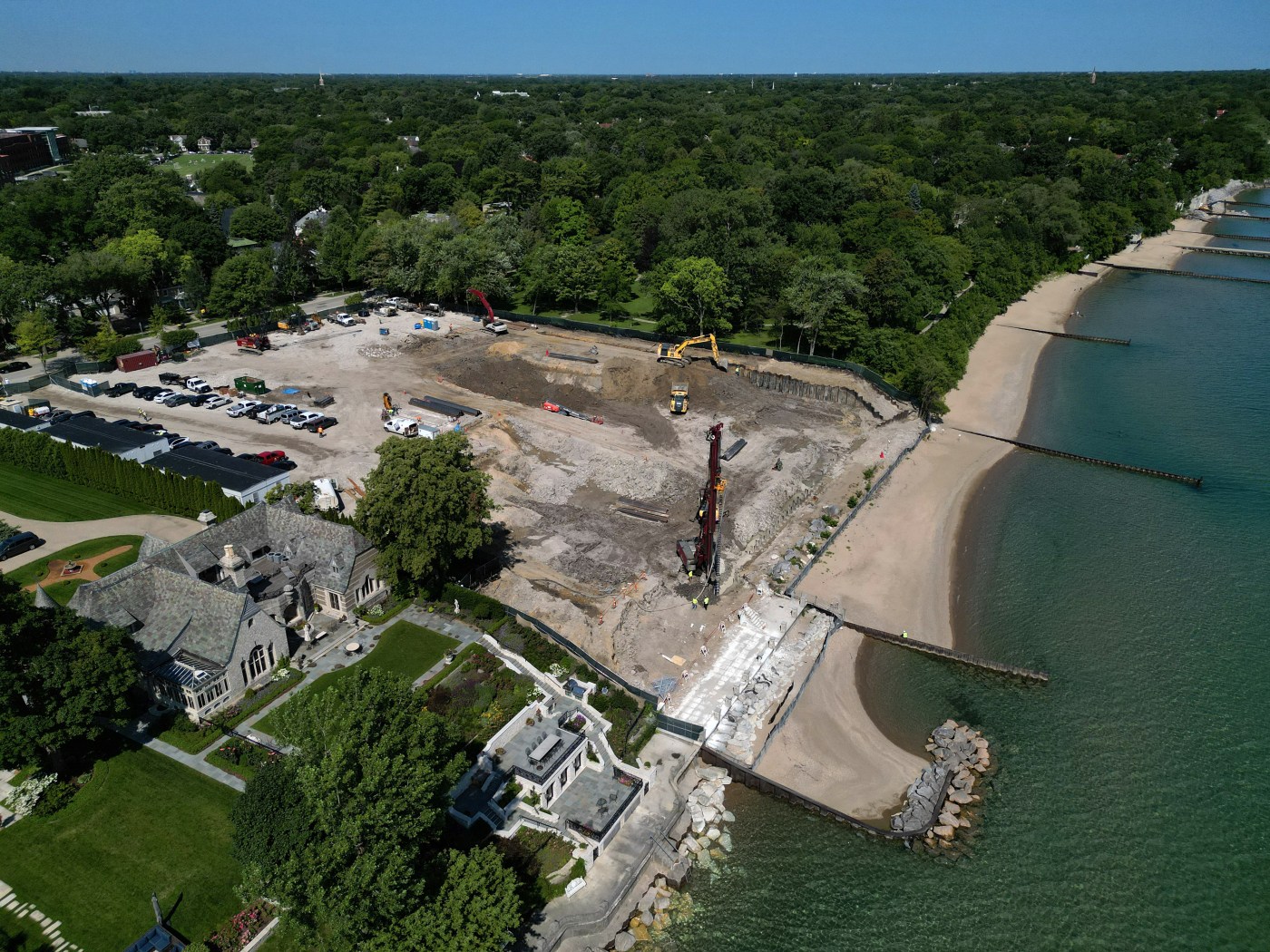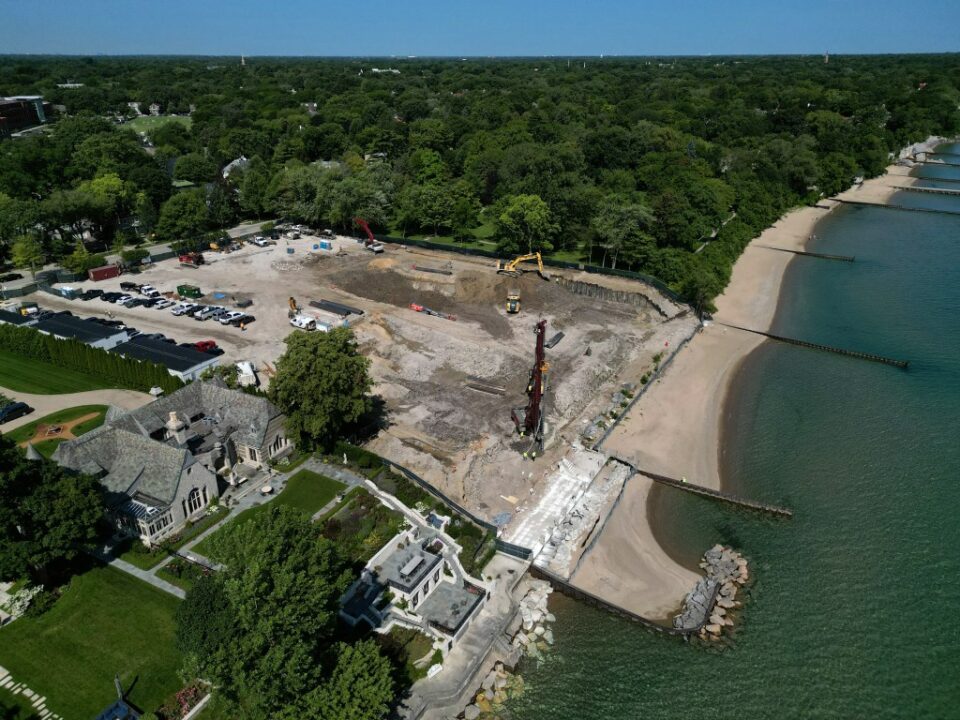
Winnetka Village Council voted unanimously to create additional protections for Lake Michigan bluffs by adopting controversial regulations around what can be built on steep slopes.
Despite some residents seeing the ordinance as a win for the environment others are unhappy with the increased regulation on privately owned lakefront property.
Winnetka was the lone lakefront community without regulations preventing from building on the bluff until the new ordinance passed.
Nearby Glencoe has steep slope ordinances in place while Highland Park, Lake Forest, Kenilworth and Lake Bluff have required buffer zones preventing construction too close to bluffs.
“All of our neighbors have this in place and have had it in place for quite some time,” said Village Trustee Kim Handler. “We’re not inventing something new here.”
The vote comes after over a year’s worth of discussion that was sparked back into life after billionaire Justin Ishbia purchased multiple plots along the lakefront and consolidated them into a 4.7-acre lot just south of the village’s Centennial Park. He intends to spend $43.7 million to construct a mansion for his family on the lot.
“People are freaked out about what they’re seeing down there and I understand that,” Winnetka Village President Chris Rintz said.
The new regulations prohibit nonconforming structures within the steep slope zone, defined as the area between the area between the toe of the bluff and the point where the 27-degree steep slope line meets the tableland at the top of the bluff. Permitted structures include boathouses of a maximum of 860 square feet and 15-foot height with allowable rooftop decks; decks of a maximum of 50 square feet; rebuilt or remodeled existing structures on existing foundations; stairs no more than 5 feet wide; necessary stabilizing retaining walls; mechanical lifts; and fences. The ordinance would also allow for extensions attached to structures over the steep slope zone of a maximum 4 feet.
Boathouses would not be allowed as to be used as a dwelling. Homeowners can also apply for variances with village council as the final authority to grant.
In previous iterations, for an existing nonconforming structure to be rebuilt, it would have had to be rebuilt upon the existing foundation. Updated language allows them to be rebuilt within the existing dimensions and footprint.
Village Council voted in July 2023 to halt lakefront construction for nine months but with the ordinance passing, that would lapse on March 18.
Plans to enact steep slope regulations are far from a new conversation in the village. Village Council slated the initiative for consideration in 2020 but the COVID-19 pandemic quickly overshadowed these plans, according to Village Trustee Bridget Orsic.
“It is hard to understand how this became a controversial issue since pretty much all Winnetkans, regardless of where they live, value and want to take good care of our lakefront,” Orsic said.
Lakefront home owners have argued against the regulations stating they spend their own time and money protecting the bluffs and current permitting processes allow for more flexibility for the widely varying lakefront parcels. Lawyer Mark Karasik with the Baker McKenzie firm spoke at the Feb. 6 meeting and announced at least 30 lakefront homeowners have retained him with intentions to sue the village if the ordinance was passed.
He argued the village didn’t follow protocol when crafting the ordinance and the ordinance infringes on lakefront homeowners property rights.
“After your family and your faith, what’s more sacred than your home?” Karasic asked the board. “These people will fight for their homes.”
Steve Fussell, a lakefront homeowner, called the board arrogant and naïve saying homeowners like him have more of a vested interest in protecting the bluffs than others whose homes wouldn’t be negatively impacted if the bluffs were to fail. He told the board he lost a 24 foot high, 60 foot wide section of the bluffs on his property during a storm in 2020 that took out a lift structure in place to help a family member with mobility issues down to the beach.
Lakefront homeowner Mandy Day told the board she purchased a home on Sheridan Road just over a year ago but wouldn’t have if she had known of the ordinance. She argued the new ordinance prevents her from making changes she planned to the property and the ordinance has made residents lose trust in the council.
“I want to be a good neighbor. I don’t want to cause my town to have to go into a lawsuit over this,” Day said. “Homeowners on the lake are proud to live in Winnetka and they have the utmost respect for the lake and keeping it secure.”
Village Trustee Bob Dearborn pushed back, saying some of those who are against the ordinance have argued for increased steep slope regulations in the past.
“It’s going to be a shame that a few residents would force the village to spend thousands upon thousands of dollars on this issue,” Dearborn said. “If it’s up to me, I think the village can and will defend itself.”
Despite the opposition by some lakefront homeowners, others in the village have praised the villages efforts to minimize the impact on the bluffs.
King Poor, a former village trustee and zoning board of appeals chair, said he believes the board has struck a fair balance with the latest version of the ordinance.
“I’ve seen my fair share of land use controversies,” Poor said. “What you’ve done is give the right effort to respect property owners rights. At the same time, you’ve taken much needed steps to protect the bluffs in Winnetka.”
Ted Wynnychenko, a frequent face at village meetings, told the board he appreciates the work they have done to bring the village in line with its neighbors.
“I don’t understand why anyone would be willing to leave behind the planet that they destroyed to their children, let alone to anyone else,” he said.
Rintz asked the council to consider tabling the vote to give further time for city staff to work with lakefront homeowners in an attempt to avoid litigation. He said he initially wasn’t certain of how necessary the ordinance was but after going through the process, he has realized the village needs to legislate to the “lowest common denominator to prevent something from happening again.”
Rintz challenged some residents characterization that the village was asleep at the wheel in allowing Ishbia to consolidate his land, saying his plan is in conformance with the village codes at the time and the village has since passed an ordinance to prevent from large lot consolidations.
“If the position is no ordinance is the only solution then don’t waste my time,” he said. “We’re a community that talks about these things and tries to find a good middle ground that everyone can live with. You may not walk away happy but at least the person that you were in opposition with isn’t walking away happy either.”
Alex Hulvalchick , 2024-02-09 19:20:27
Source link


